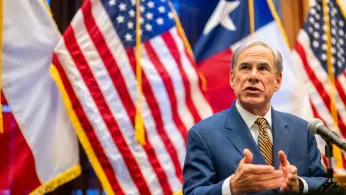
5 hours ago
Texas Governor Signs Sweeping Bathroom Bill, Restricting Transgender Access to Public Facilities
READ TIME: 4 MIN.
On Monday, September 22, 2025, Texas Governor Greg Abbott signed Senate Bill 8 (SB 8) into law, marking a significant escalation in legislative restrictions on bathroom access for transgender people in Texas. With this move, Texas becomes the twentieth state to enact such laws, joining a growing list of states implementing measures that require individuals to use public restroom and locker room facilities in government buildings according to the sex listed on their birth certificate, rather than their gender identity .
Texas has a long history of debating so-called “bathroom bills,” with the first such proposal introduced in 2015. Although six different bills passed the Texas Senate since 2017, none survived the House until SB 8. The law comes on the heels of recent legislation redefining sex and gender in Texas law, effective September 1, 2025, further shaping the legal landscape for LGBTQ+ rights in the state .
SB 8, also known as the Texas Women's Privacy Act, was passed during a special legislative session on September 3, 2025. The law is notable for its scope and severity, targeting not only restroom and locker room access in government buildings—including K-12 schools, universities, and prisons—but also restricting transgender prisoners from being housed in facilities that align with their gender identity .
Under SB 8, access to bathrooms, locker rooms, and similar facilities in government-owned buildings is restricted strictly to individuals’ sex assigned at birth. The law creates exceptions only for children under ten who are accompanied by adults, as well as for custodians, law enforcement, and medical workers .
Facilities found to be in violation face steep penalties: a $25,000 fine for first-time violations and $125,000 for subsequent violations, with fines accruing daily. These penalties are among the highest for such laws in the United States, quintupled through an amendment prior to passage. Private citizens may file complaints, which will be investigated by the Texas Attorney General’s office .
The law will take effect on December 4, 2025 .
Governor Abbott announced the signing in a video posted to the social media platform X. In the video, he described the bill as “just common sense,” stating that its intent is to keep “men out of women’s restrooms” . Supporters of the bill—including Republican lawmakers and organizations such as Alliance Defending Freedom—have framed SB 8 as a measure to protect the privacy and safety of women and girls. Sara Beth Nolan, legal counsel for Alliance Defending Freedom, said in a statement, “Women and girls should not be forced to sacrifice their privacy and safety in the name of promoting gender ideology. Allowing men to invade girls’ most intimate spaces — including locker rooms, sleeping areas, or restrooms — compromises their dignity” .
The passage of SB 8 in the Texas House was marked by intense debate and public protest. During the final vote, which resulted in an 86-45 approval, disruptions from gallery visitors led to the gallery’s evacuation by staff and Department of Public Safety officers. Opponents of the bill, including many Democratic lawmakers and LGBTQ+ advocates, have condemned the legislation as discriminatory and harmful to transgender individuals .
Civil rights and LGBTQ+ organizations have decried the law as one of the nation’s harshest, warning that it will further stigmatize transgender people and increase their vulnerability to harassment and violence in public spaces .
Advocates point out that transgender people already face significant barriers to accessing safe public facilities, and that SB 8 will force many to choose between risking legal penalties or facing unsafe situations. The law’s impact will be particularly acute in schools and universities, where transgender youth often struggle with acceptance and inclusion. Mental health experts warn that such policies can contribute to increased distress, anxiety, and depression among transgender students .
National organizations such as the Human Rights Campaign have condemned the passage of SB 8, emphasizing that restricting restroom access based on sex assigned at birth is not supported by evidence and is widely considered by medical and psychological associations to be harmful to transgender people.
With the signing of SB 8, Texas becomes the twentieth state to pass such legislation. Similar laws have faced court challenges in other states, with varying results; some have been struck down as unconstitutional, while others remain in effect. Legal experts anticipate that SB 8 will be challenged in court, potentially testing the limits of federal protections for transgender individuals under Title IX and the Equal Protection Clause of the Fourteenth Amendment .
In response to the law’s passage, local and national LGBTQ+ organizations are mobilizing to support affected communities, provide legal resources, and advocate for policy change. Many are encouraging transgender people and allies to share their stories, raise awareness, and participate in upcoming legal and civic actions.
Texas now joins a growing number of states in legislating restrictions on transgender rights, reflecting a broader national debate over inclusion, privacy, and public policy. As SB 8 takes effect, its real-world impact on transgender Texans—and the legal challenges likely to follow—will be watched closely by advocates across the country.






